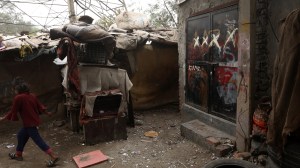India pushes a 2nd bus to Pak
The Foreign Secretaries of India and Pakistan concluded their first dialogue today in six years with a 8216;8216;detailed exchange of view...

The Foreign Secretaries of India and Pakistan concluded their first dialogue today in six years with a 8216;8216;detailed exchange of views on Jammu 038; Kashmir,8217;8217; even as New Delhi proposed a slew of Kashmir-specific initiatives so as to build confidence between people living on both sides of the Line of Control.
Significantly, the joint statement that emerged from the two days of talks was deliberately accorded its very muted flavour after the Pakistani side requested that it 8216;8216;be given more time8217;8217; to study the radical cross-LoC transport links proposed by New Delhi.
Taking a cue from J038;K chief minister Mufti Mohammed Sayeed, who has reiterated over the last many months that such transport links constituted a major confidence-building measure, the Indian side is believed to have gone beyond its dramatic proposal of running a cross-LoC bus from Srinagar to Muzaffarabad, by also proposing a bus link from Suchetgarh to Sialkot.
Since the Pakistanis insisted that the 8216;8216;wishes of the Kashmiri people8217;8217; must be taken into account, the Indian side argued, the best way to do so would be to allow Kashmiris from both sides of the LoC to meet each other.
Pakistan Foreign Secretary Riaz Khokhar, however, preferred the much more circumspect route to resolving the 8216;8216;disputed8217;8217; nature of Kashmir, and asked for more time at Hyderabad House to discuss the issue back home. As a result, the joint statement only makes a very watered-down reference to a 8216;8216;comprehensive framework for conventional CBMs aimed at initiating and enhancing communication, coordination and interaction.8217;8217;
MEA spokesman Navtej Sarna also only allowed himself a very broad reference to the issue when he said that New Delhi had proposed CBM 8216;8216;areas8217;8217; such as transport links, trade, people-to-people contacts, cultural cooperation and the environment.
The joint statement, however, enumerated in detail the series of non-military CBMs, including the decision to raise strengths of the two missions back to 110, reestablish the consulates in Mumbai and Karachi, release fishermen that were caught on the high seas without returning them to port and early release of civilian prisoners. The two Foreign Secretaries, the statement said, 8216;8216;reiterated the hope that the dialogue will lead to peaceful settlement of all bilateral issues, including Jammu 038; Kashmir, to the satisfaction of both sides.8217;8217;
Over the last few weeks, as New Delhi prepared to deal with the 8216;8216;disputed8217;8217; nature of Kashmir in new, creative ways, it began to focus on ways and means to demystify what Pakistan meant by the 8216;8216;core8217;8217; issue of Kashmir. With Pakistan spokesman Masood Khan reiterating that the Kashmiri people were a 8216;8216;principle party to the dispute,8217;8217; New Delhi calculated that Khokhar8217;s team could hardly reject CBMs made to improve the lot of Kashmiris living on both sides of the LoC.
The logjam over documents that passengers would carry on the Srinagar-Muzaffarabad bus link was postponed for technical-level talks that both sides are likely to hold before the two Foreign ministers meet in Islamabad in August.
While Masood denied that the 8216;8216;documents issue8217;8217; had been discussed, he also pointed out that 8216;8216;there was no problem8217;8217; over Pakistan8217;s position, that former PM Jamali had stated that all measures could be considered, and that he was sure that technical-level talks would be able to 8216;8216;sort it out.8217;8217;
Meanwhile, Pakistan proposed that the proposed bus link from Khokhrapar to Munabao on the international boundary in Rajasthan be converted into a train link, with which the Indian side was agreeable.
A new schedule of talks on the six remaining issues of hte composite dialogue will now be held from the third week of July to mid-August in both capitals. Significantly, the joint statement reiterated the need to promote a stable environment of peace and security, recognising that each other8217;s nuclear capabilities constituted a factor for stability. They promised also to work for 8216;8216;strategic stability8217;8217; and called upon the nuclear powers to discuss issues of common concern.
But perhaps the greatest value of this revivified round of dialogue has been the fact that the conversations were held in a remarkably friendly atmosphere, free from rancour and recrimination that has marred previous processes.
Masood Khan referred to the 8216;8216;new spirit that energised8217;8217; the talks, and the decision that both sides took to move forward 8216;8216;constructively, substantively and sincerely.8217;8217;
- 01
- 02
- 03
- 04
- 05































